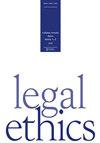Soft law, legal ethics and the corporate lawyer: confronting human rights and sustainability norms
IF 0.3
Q1 LAW
引用次数: 0
Abstract
We are all familiar with the old adage that hard cases make for bad law. This symposium riffs off that idea to inquire whether soft law can make for (great) ethical lawyering? To interrogate this question, the Schulich School of Law at Dalhousie University, Canada, hosted the 30th annual Wickwire Lecture and invited several scholars from different jurisdictions to share their reflections on the complicated, but increasingly common, challenges of the relationship between emerging soft law norms and the ethical obligations of corporate lawyers. Soft law norms for corporate actors emerge from a variety of sources, and a bright line between ‘hard’ and ‘soft’ law is often not obvious. For example, from the international human rights law sphere, the United Nations Guiding Principles on Business and Human Rights (UNGPs) were endorsed by the member states of the UN Human Rights Council in 2011. The UNGPs were developed over a number of years through many multi-stakeholder processes that included input from states, business actors, and non-governmental human rights organisations, as well as corporate lawyers. Often referred to as the authoritative global standard on business and human rights, the UNGPs are comprised of three pillars: 1) the state duty to protect human rights in accordance with existing international human rights law; 2) the business responsibility to respect human rights as a reflection of social expectations; and 3) the need for effective access to remedy for victims of business-related human rights abuses, whether through judicial, non-judicial, state-based, or non-state-based processes, including company-level grievance processes. Particularly, pillar two further provides that corporate actors should adopt human rights policies, engage in human rights due diligence throughout the business enterprise, and both prevent and account for human rights impacts that they identify, among other conduct. However, while the point of reference软法、法律伦理和企业律师:面对人权和可持续性规范
我们都熟悉这句古老的格言:棘手的案件导致糟糕的法律。本次研讨会借用了这一观点来探讨软法律是否能造就(伟大的)道德律师?为了探究这个问题,加拿大达尔豪斯大学舒利希法学院举办了第30届年度Wickwire讲座,并邀请了来自不同司法管辖区的几位学者分享他们对新兴的软法律规范与公司律师的道德义务之间关系的复杂但日益普遍的挑战的思考。针对企业行为者的软法律规范有多种来源,“硬”法和“软”法之间的界限往往并不明显。例如,在国际人权法领域,2011年联合国人权理事会成员国批准了《联合国工商业与人权指导原则》。《联合国指导原则》是多年来通过许多多方利益攸关方进程制定的,其中包括国家、商业行为者、非政府人权组织以及公司律师的投入。通常被称为工商业与人权方面的权威全球标准,《联合国全球指导原则》由三个支柱组成:1)根据现有国际人权法,国家有义务保护人权;2)企业尊重人权的责任是社会期望的反映;3)与企业有关的侵犯人权行为的受害者需要有效获得补救,无论是通过司法、非司法、基于国家或非国家的程序,包括公司一级的申诉程序。特别是,支柱二进一步规定,公司行为者应采取人权政策,在整个商业企业中进行人权尽职调查,除其他行为外,预防和解释其确定的人权影响。然而,虽然参考点
本文章由计算机程序翻译,如有差异,请以英文原文为准。
求助全文
约1分钟内获得全文
求助全文

 求助内容:
求助内容: 应助结果提醒方式:
应助结果提醒方式:


